Kiwithrottlejockey
Admin Staff
XNC2 GOD

Posts: 32252
Having fun in the hills!
|
From the Los Angeles Times....Pete Seeger dies at 94; balladeer was America's conscienceAn advocate for peace and civil rights, Pete Seeger helped spark the folk
music revival with his five-string banjo and songs calling for justice.By CLAUDIA LUTHER | 11:53PM PST - Moday, January 27, 2014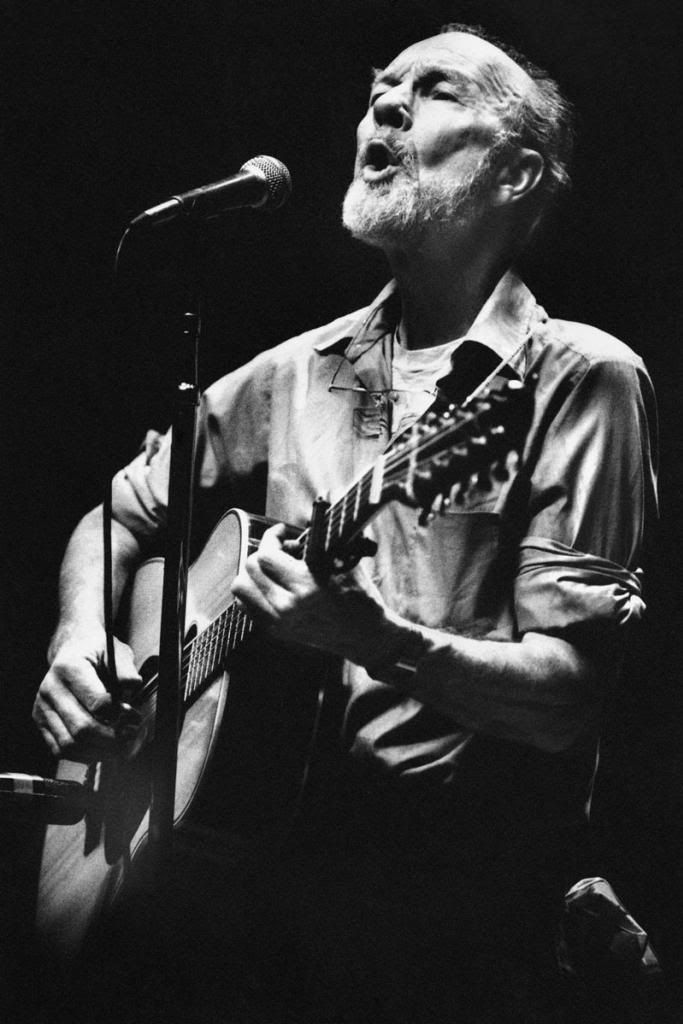 Folk singer Pete Seeger performing in a one-man benefit concert in Berkeley, California, at the Berkeley Community Theater. Folk singer Pete Seeger performing in a one-man benefit concert in Berkeley, California, at the Berkeley Community Theater.
The American troubadour, folk singer and activist Seeger died on Monday, January 27th, 2014, at age 94.
— Photo: Mark Costantini/Associated Press/February 25th, 1984.PETE SEEGER, the iconoclastic American singer, songwriter and social activist who did battle with injustice in America armed with a banjo, a guitar and the transformative power of song, has died. He was 94.
Seeger died Monday at New York Presbyterian Hospital, his grandson Kitama Cahill-Jackson told the Associated Press.
A veteran of the labor, peace and civil rights movements, Seeger remained relevant as an activist into his 90s. He was equally musician and revolutionary, playing a major role in the folk music revival that began in the late 1950s while helping to craft the soundtrack of 1960s protests through such songs as "We Shall Overcome", "Where Have All the Flowers Gone" and "Turn! Turn! Turn!".
"At some point, Pete Seeger decided he'd be a walking, singing reminder of all of America's history," Bruce Springsteen said at the all-star Madison Square Garden concert marking Seeger's 90th birthday in 2009.
"He'd be a living archive of America's music and conscience, a testament to the power of song and culture to nudge history along, to push American events towards a more humane and justified ends," said Springsteen, who had performed Woody Guthrie's "This Land Is Your Land" with Seeger at the Lincoln Memorial concert marking President Obama's 2008 inauguration.
Gifted at connecting with audiences, Seeger called his ability to inspire regular folks to sing along his "cultural guerrilla tactic." "There's no such thing as a wrong note as long as you're singing it," he told the 15,000-strong crowd at his birthday celebration.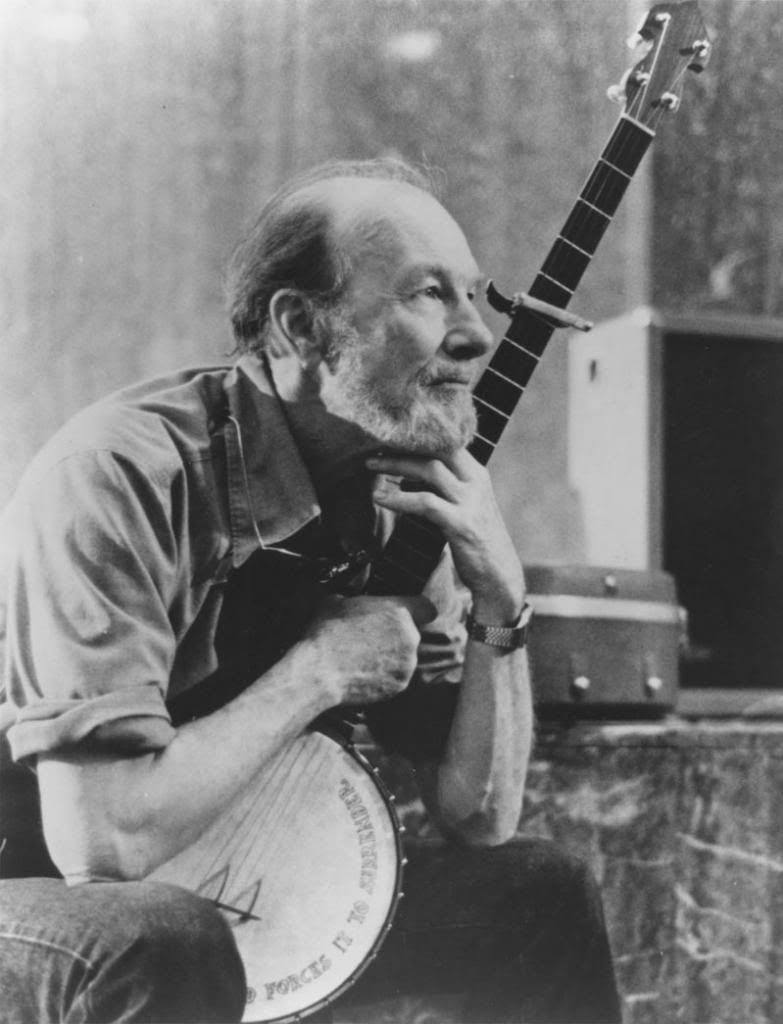 Pete Seeger on May 16th 1997. — Photo: Pete Seeger handout image. Pete Seeger on May 16th 1997. — Photo: Pete Seeger handout image.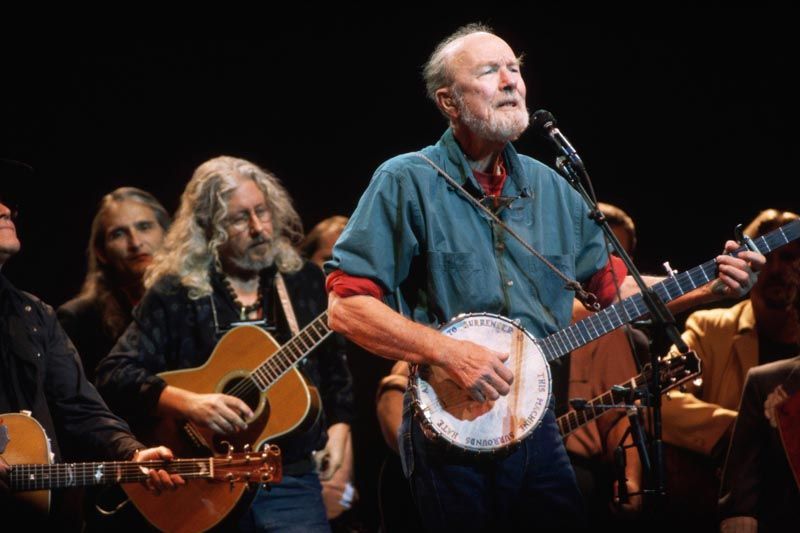 Seeger plays the banjo and sings with Arlo Guthrie, back left, at the Woody Guthrie Tribute Concert at Severance Hall in Cleveland Seeger plays the banjo and sings with Arlo Guthrie, back left, at the Woody Guthrie Tribute Concert at Severance Hall in Cleveland
in September 1996. — Photo: Neal Preston/Corbis.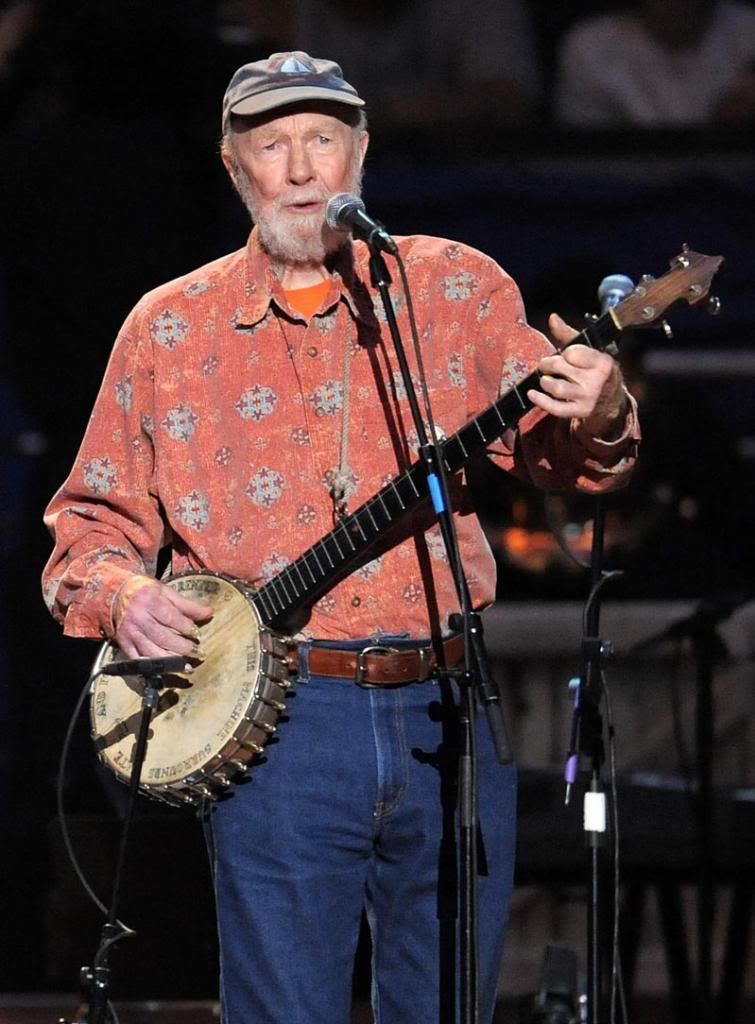 At a benefit celebrating his 90th birthday, Seeger performs at Madison Square Garden in New York on May 3rd, 2009. At a benefit celebrating his 90th birthday, Seeger performs at Madison Square Garden in New York on May 3rd, 2009.
— Photo: Evan Agostini/Associated Press.Seeger's life of music and political activism could be summed up in "The Hammer Song", the enduring anthem he wrote more than 60 years ago with his good friend Lee Hays to support the progressive political movement in the U.S. …
If I had a hammer,
I'd hammer in the morning,
I'd hammer in the evening,
All over this land/ I'd hammer out danger,
I'd hammer out a warning,
I'd hammer out love between my brothers and my sisters,
All over this land.
Popularized by Peter, Paul and Mary in the 1960s, the song embodied the heart of Seeger: his musicality, his activism, his optimism and his lifelong belief that songs could and should be used to build a sense of community to make the world a better place.
"I'd really rather put songs on people's lips than in their ears," he said.
Seeger inspired a generation of folk singers and musicians that included the Kingston Trio and Joan Baez, who once said: "We all owe our careers to Pete Seeger."
As a member of two influential folk groups, the Almanac Singers and the Weavers, Seeger wrote or co-wrote "We Shall Overcome", the anthem of the civil rights movement based on an early 20th century gospel song; "Where Have All the Flowers Gone", which became an anti-Vietnam War protest song; and another political anthem, "Turn! Turn! Turn!", which turned to a passage from the Bible — "to everything there is a season" — for the lyrics.
"Pete is America's tuning fork," author and oral historian Studs Terkel once said. "His songs capture the essence and beauty of this country."
Photographs of the tall, lanky Seeger in buoyant performance often show his head lifted, as if he had spotted his place in heaven and wanted to bring everyone else along. A storyteller known more for his charisma and message than for his voice, he is credited with single-handedly popularizing the five-string banjo. His was inscribed: "This machine surrounds hate and forces it to surrender."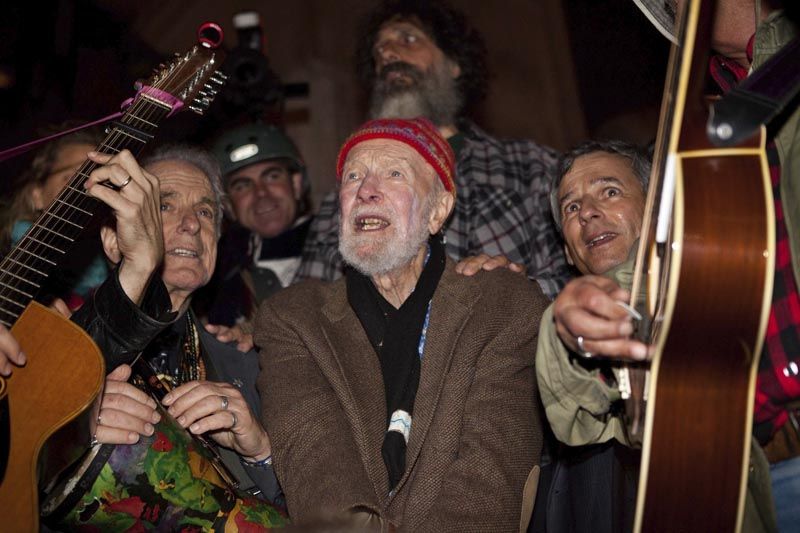 Pete Seeger, center, sings before a crowd of nearly a thousand demonstrators sympathetic to the Occupy Wall Street protests Pete Seeger, center, sings before a crowd of nearly a thousand demonstrators sympathetic to the Occupy Wall Street protests
at a brief acoustic concert in Columbus Circle in New York on October 21st, 2011. — Photo: John Minchillo/Associated Press.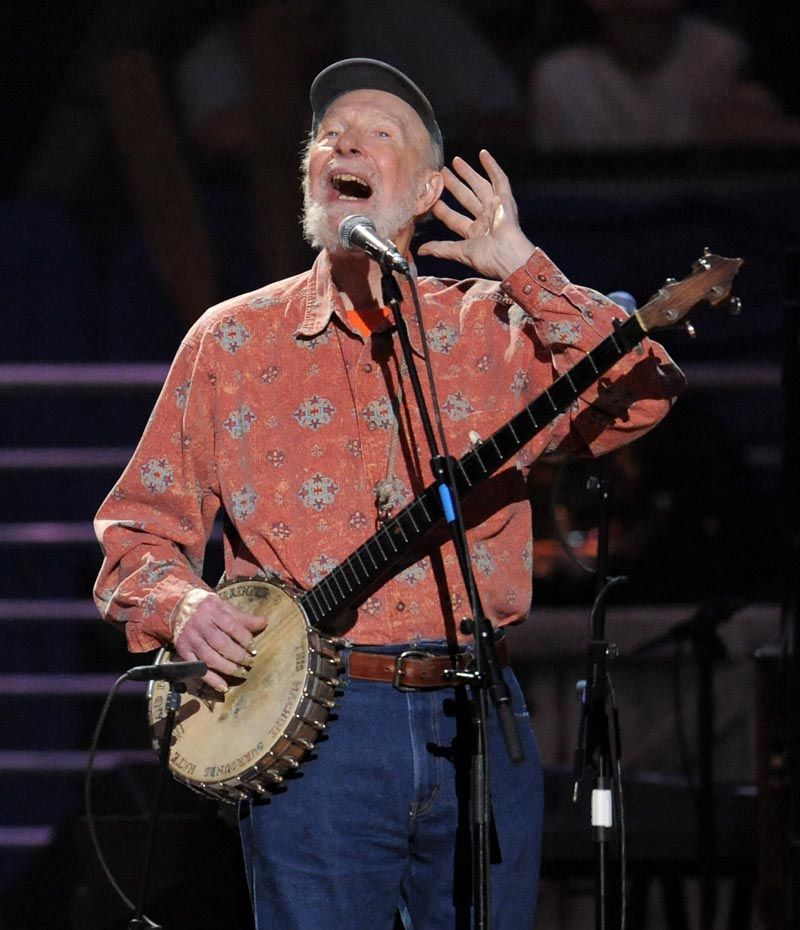 Seeger sings out at his 90th birthday benefit concert on May 3rd, 2009. — Photo: Evan Agostini/Associated Press. Seeger sings out at his 90th birthday benefit concert on May 3rd, 2009. — Photo: Evan Agostini/Associated Press.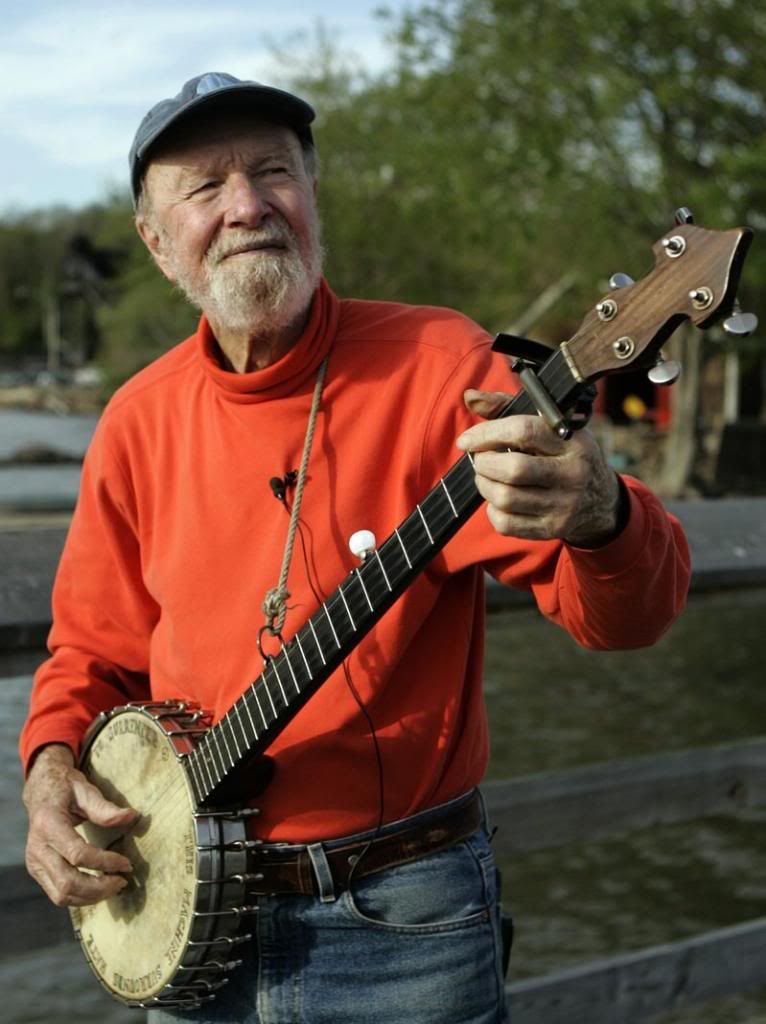 Pete Seeger plays his banjo on May 5th 2006 in Beacon, New York. — Photo: Frank Franklin II/Associated Press.He was born May 3rd, 1919, in Patterson, New York, into a musical family that was rich in religious dissenters, abolitionists and Revolutionary solders and "shot through with pedagogues," according to Seeger. Pete Seeger plays his banjo on May 5th 2006 in Beacon, New York. — Photo: Frank Franklin II/Associated Press.He was born May 3rd, 1919, in Patterson, New York, into a musical family that was rich in religious dissenters, abolitionists and Revolutionary solders and "shot through with pedagogues," according to Seeger.
His father, Charles Louis Seeger, was a noted musicologist and educator, and his mother, Constance de Clyver Edson, was a violinist and teacher. After his parents divorced, his father married Ruth Crawford, a composer.
Young Peter attended boarding school in Connecticut before enrolling at Harvard University, where he majored in sociology.
Never an enthusiastic student, he dropped out of Harvard in 1938 after attending an Appalachian song and dance festival in Asheville, North Carolina, with his father. While there he heard "Aunt" Samantha Bumgarner, who was "picking a banjo and singing old ballads and having so much fun," he later recalled.
Seeger fell in love with the old-fashioned five-string banjo. "I liked the rhythms," he said. "I liked the melodies, time-tested by generations of singers." Above all, he said, he liked the words.
"Compared to the trivialities of most popular songs, the words of these songs had all the meat of human life in them," Seeger said. "They sang of heroes, outlaws, murderers, fools. They weren't afraid of being tragic instead of just sentimental.... Above all, they seemed frank, straightforward, honest."
For a time, Seeger played banjo for children in his aunt's classroom. At 17, he met celebrated musicologist Alan Lomax, who hired him to transcribe songs from the Library of Congress collection. Through Lomax, he met Huddie "Lead Belly" Ledbetter, king of the 12-string guitar and a living archive of black American music, who broadened Seeger's musical horizons.
"I think of Lead Belly always sitting up straight and singing right out straight," Seeger once said, using a description that could apply to his own musicianship. "No slyness, no finagling, no tricks."
On March 3rd, 1940, at a "Grapes of Wrath" migrant worker benefit concert, Seeger met Guthrie. The renaissance of the American folk song could be pegged to that night, Lomax later said.
Seeger rejoined Guthrie and Millard Lampell in New York City, playing the "subway circuit" — left-wing fund-raising parties. They soon formed the Almanac Singers, which also included Hays and a changing cast of others. The group sang such activist tunes as "The Talking Union Blues" and the pacifist song "The Ballad of October 16th".
When the Almanac Singers prepared to play before about 1,000 longshoremen, Seeger later said he heard some of them say, "What the heck are these hillbilly singers coming here for? We have work to do." By the time the group was done performing, the union members were on their feet.
Singing for union causes became almost a religion for Seeger, who — along with Guthrie and Ledbetter — helped bring folk music from the country into the big cities, mixed with a heavy dose of politics.
Seeger offered a simple analysis of his partnership with Guthrie: "I didn't play too fancy — just gave him the right note at the right time with the right rhythm."
This same modesty led Seeger to try to share the credit and profits on songs he recorded. He was "a hunter and gatherer" who edited and adapted songs "from half-remembered hymns and renewable folk tunes, Bible verses and poets' words, traditional songs that need a little tinkering," the Los Angeles Times said in 1998. Seeger was the first to acknowledge his source material.
The Almanac Singers broke up with the advent of World War II and Seeger served in the Army Special Services, entertaining troops in the U.S. and the South Pacific. After the war, Seeger formed the Weavers with Hays and others.
After a slow start, they began attracting crowds, and then, as Seeger described it, "lightning struck": Bandleader and composer Gordon Jenkins "fell in love with our work" and got the group a recording contract.
The Weavers' early recording of Ledbetter's "Goodnight, Irene" was a big hit. Soon, they were on the charts with other tunes, including a classic, "On Top of Old Smokey", and "Kisses Sweeter Than Wine". In all, the group sold 4 million or so records — astonishing at the time — and played top nightclubs in America.
As the group's popularity grew, so did interest in Seeger's connection to the Communist Party, which he had joined at Harvard. He once believed the party would help the common man, he said, but had spurned it in disgust by 1949. Yet he never apologized for this earlier belief.
"I'd like to see a world without millionaires," Seeger said in 1993.
Called before the House Un-American Activities Committee in 1955 to explain his Communist Party membership, Seeger refused to answer questions about his personal beliefs and was held in contempt of Congress. Sentenced to a year in jail, he served a few hours before being released. The case was dismissed years later.
The controversy shattered Seeger's career. He continued to record and make concert appearances but was barred from network TV for 17 years.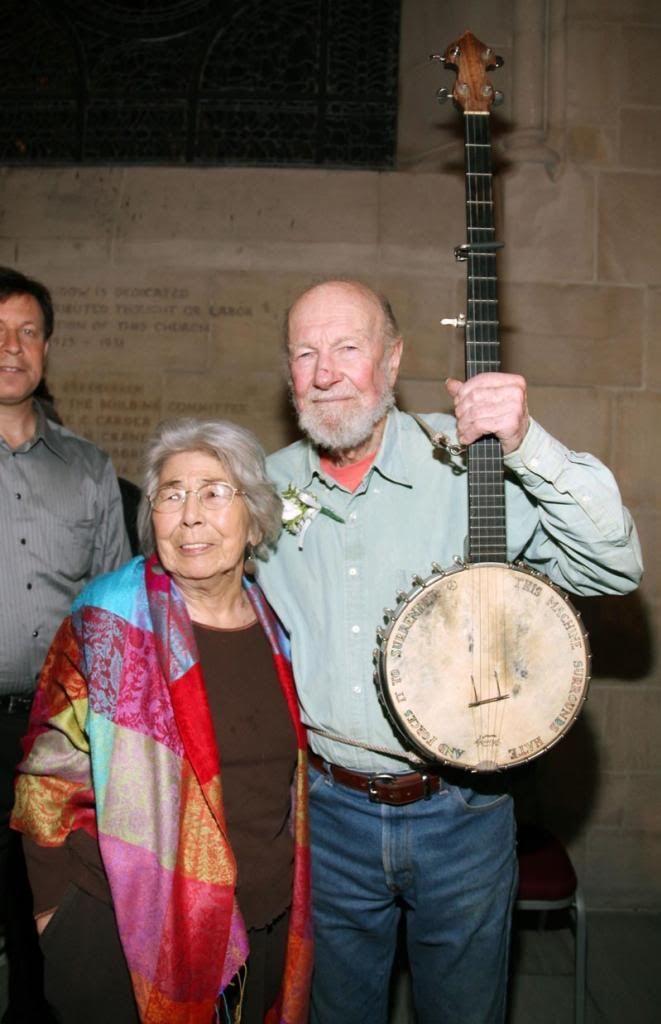 Pete Seeger and his wife, Toshi, are shown on February 24th, 2009 in New York. — Photo: Astrid Stawiarz/Getty Images. Pete Seeger and his wife, Toshi, are shown on February 24th, 2009 in New York. — Photo: Astrid Stawiarz/Getty Images.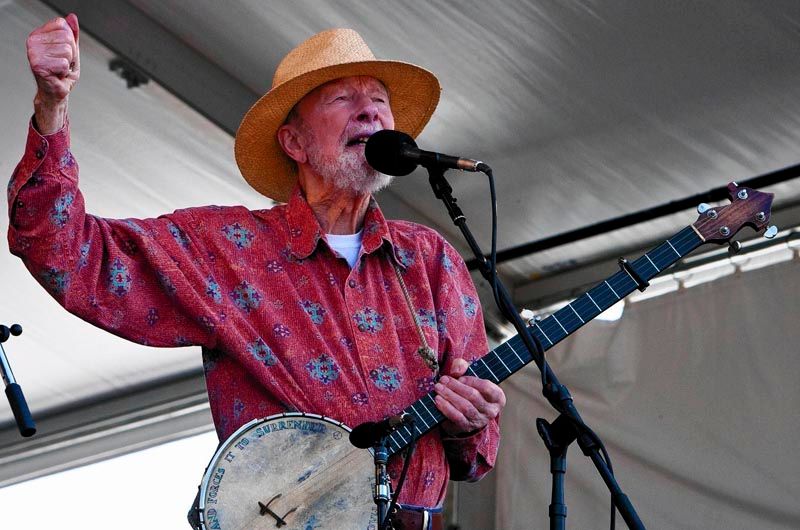 US folk singer and activist Pete Seeger performs at the New Orleans Jazz and Heritage Festival, in New Orleans, Louisiana, US folk singer and activist Pete Seeger performs at the New Orleans Jazz and Heritage Festival, in New Orleans, Louisiana,
USA, April 25th, 2009. — Photo: Skip Bolen/EPA. Pete Seeger performing on stage during the Farm Aid 2013 concert at Saratoga Performing Arts Center in Saratoga Springs, Pete Seeger performing on stage during the Farm Aid 2013 concert at Saratoga Performing Arts Center in Saratoga Springs,
New York. — Photo: Hans Pennink/Associated Press.By the early 1960s, he had returned to performing at schools and colleges and came to view the blacklist as a blessing in disguise: He was showing "a whole generation of young people you didn't need to depend on the commercial world to make a living."
With other, younger folk singers, Seeger joined the anti-Vietnam War effort in the mid-1960s and travelled to Hanoi on a peace mission in the early 1970s.
When he finally returned to television in 1967 on "The Smothers Brothers Comedy Hour" on CBS, his antiwar song, "Waist Deep in the Big Muddy", was censored. But after his performance was broadcast the next year, it was credited with helping to cement public opinion against the war.
He was also involved in environmental causes, including the cleanup of the Hudson River around his home near Beacon, New York. Seeger helped devise a plan to use a replica of a 19th century sloop, the Clearwater, to sail from port to port along the river to educate residents about the waterway's condition.
It was not uncommon to see Seeger, as he approached 90, holding a placard by the roadside near his upstate New York home as he stood with a small group protesting the war in Iraq.
As recently as 2011, he lent his voice to the Occupy Wall Street movement, leaning on two canes to march through crowds of New York City protesters before singing "We Shall Overcome" with a longtime collaborator, Woody Guthrie's son Arlo.
In August 2012, Seeger appeared on "The Colbert Report", accompanying himself on banjo and singing in a thin but clear voice his 1969 song "Quite Early Morning". Looking far younger than his 93 years, he credited "outdoor work," including splitting logs, with keeping him healthy.
Seeger was awarded the National Medal of Arts in 1994, the same year he was honored by the Kennedy Center. In 1996, he was inducted into the Rock and Roll Hall of Fame and won a Grammy Award for best traditional folk album for "Pete". A 2008 album, "Pete Seeger at 89", also won a Grammy. In all, he recorded dozens of albums and records, and compiled a series of instructional songbooks.
His wife, Toshi, whom he married in 1943, died in 2013. His survivors include son Danny and daughters Mika and Tinya Seeger-Jackson.
When people asked the ever-upbeat Seeger if he ever got discouraged, he'd reply: "I say ‘the hell with it’ every night around 9:30 then get up the next morning. Besides, if you sing for children, you can't really say there's no hope."• Claudia Luther is a former Los Angeles Times staff writer.• Former Los Angeles Times staff writer Valerie J. Nelson contributed to this report.http://www.latimes.com/obituaries/la-me-pete-seeger-20140128,0,2122566,full.story
From the Los Angeles Times....Pete Seeger dies: The folk singer's movie and TV lifeBy OLIVER GETTELL | 12:19PM PST - Tuesday, January 28, 2014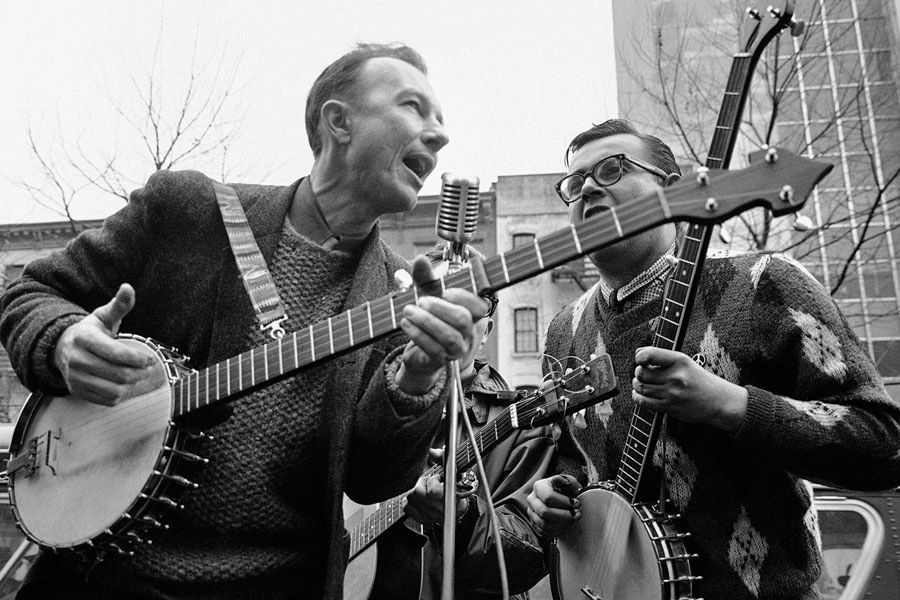 Folk singer Pete Seeger, left, performing at the Rally for Détente at Carnegie Hall in New York. The American troubadour, folk singer Folk singer Pete Seeger, left, performing at the Rally for Détente at Carnegie Hall in New York. The American troubadour, folk singer
and activist Pete Seeger died on Monday, January 27th, 2014, at age 94. — Photo: Richard Drew/Associated Press/May 13th, 1975.PETE SEEGER, the singer, songwriter and social activist who died Monday at age 94, didn't have much of a movie career, making his mark with music instead. But the troubadour did pop up on screen from time to time, in documentaries, concert footage, his own TV series and even the odd comedy. Here's a look at some of Seeger's work on the big and small screens.______________________________________ "To Hear Your Banjo Play" (1947)In 1947, a young Seeger appeared in and narrated this 16-minute survey of folk music in the U.S. written by musicologist Alan Lomax. The short opens with Seeger playing "Sally Ann", after which Lomax calls to him from off-screen and says, "Hello there, Peter. What's that funny-looking guitar you're playing?" Seeger also participated in a 2004 documentary about Lomax called "Lomax the Songhunter".______________________________________ "Pete Seeger: Live in Australia" (1963)Seeger, who had landed on the McCarthy-era Hollywood blacklist, embarked on a 10-month world tour in 1963. This concert documentary captures a 105-minute show in Melbourne, in which he performs such songs as "If I Had a Hammer" and "Michael, Row the Boat Ashore".______________________________________ "Rainbow Quest" (1966)As Seeger's blacklisting began to end in the mid-'60s, he hosted a regional folk-music program called "Rainbow Quest". This 1966 episode features Johnny Cash and June Carter.______________________________________ "The Internationale" (2000)Ever the activist, Seeger participated in this documentary about the left-wing anthem "The Internationale". In the trailer below, Seeger says, "If there's a world here 100 years from now, this song will be part of that world."______________________________________ "Pete Seeger: The Power of Song" (2007)Seeger himself was the subject of a documentary in 2007, a mix of interviews, archival footage and home movies illuminating his life and work that aired as part of PBS' acclaimed "American Masters" series. In the film, fellow musician Bonnie Raitt says Seeger's greatest gift "was shepherding songs of peace and justice."______________________________________ http://www.latimes.com/entertainment/movies/moviesnow/la-et-mn-pete-seeger-dies-movies-songs-20140128,0,5306655.story
|